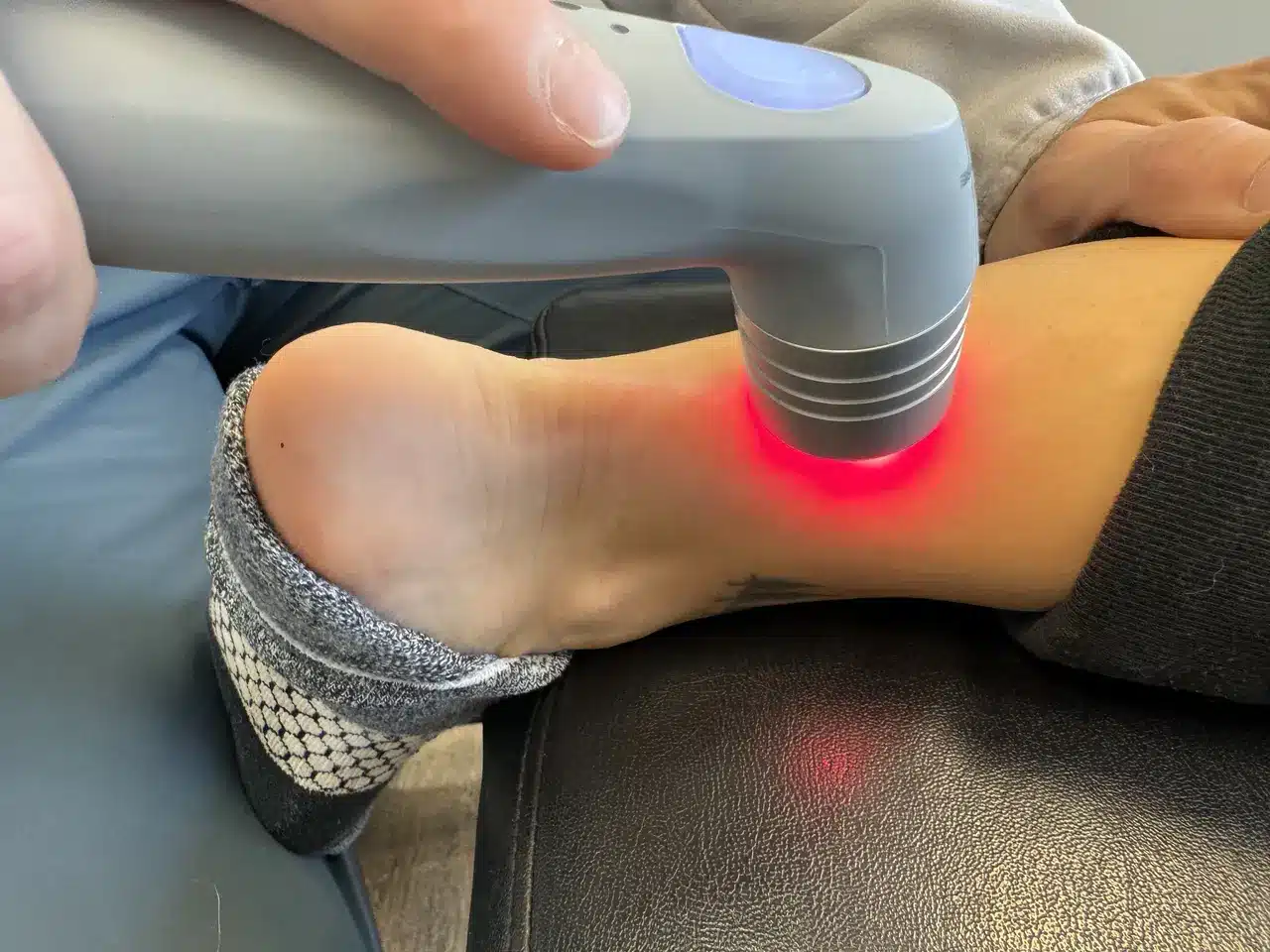What causes foot pain?
The most common cause of foot pain is wearing ill-fitting or unsupportive footwear. High heels and narrow toe boxes can put excessive pressure on the feet, leading to issues like bunions and corns. Flat feet or high arches can also contribute to foot pain because they affect the alignment and distribution of weight in the feet. Additionally, injuries, overuse, and conditions like arthritis can cause foot pain.
Common types of foot pain therapy
There are various types of foot pain therapy that are commonly used to relieve discomfort and improve mobility. Some of the most common include:
- Physical Therapy: Involves targeted exercises and stretches to strengthen the muscles and improve flexibility in the feet and lower legs.
- Orthotics: Custom-made shoe inserts that provide support and help correct issues with foot alignment.
- Massage Therapy: Techniques such as deep tissue massage can help alleviate tension and promote relaxation in the feet and lower legs.
- Cold Therapy: Using ice packs or cold compresses to reduce inflammation and numb pain in the affected area.
These therapies can be effective in addressing a range of foot pain issues, but it’s essential to consult with a healthcare professional to determine the most suitable approach for your specific condition.
Physical therapy for foot pain
Physical therapy for foot pain can be an effective way to reduce discomfort and improve mobility. It typically involves tailored exercises and stretches to strengthen the muscles and improve flexibility in the feet and ankles. Here are some key points to consider:
- Physical therapy can help address various foot conditions such as plantar fasciitis, Achilles tendonitis, and flat feet.
- The therapist will assess your condition and create a personalized treatment plan to target your specific needs.
- Exercises may include stretching, strengthening, balance training, and manual techniques to alleviate pain and improve function.
- By following the recommended exercises and guidance from your therapist, you can expect to see improvements in your foot pain over time.
Remember, consistency and dedication to the prescribed therapy plan are essential for achieving positive results.
The role of orthotics in foot pain therapy
Orthotics are shoe inserts that provide support for your feet. They can help with foot pain by improving your foot’s alignment and reducing pressure on certain areas. According to the American Podiatric Medical Association, orthotics can also help with issues like foot deformities, arthritis, and sports injuries. Custom orthotics are specifically made for your feet, while over-the-counter ones are more general and may not fit as well. Many people find relief from foot pain with orthotics, but it’s important to talk to a podiatrist to find the best option for you.
Chiropractic care for foot pain relief
Chiropractic care can offer relief for foot pain by focusing on spinal adjustments to improve overall body function. Through adjustments and manual therapies, chiropractors aim to reduce inflammation and improve mobility in the foot and ankle. According to the American Chiropractic Association, chiropractic care for foot pain may include spinal adjustments, soft tissue therapy, and exercises to strengthen the muscles supporting the foot. Chiropractors can also provide guidance on posture and footwear to help prevent future foot pain.
Massage therapy for foot pain
Massage therapy can be an effective treatment for foot pain. It helps to improve blood circulation, reduce inflammation, and release tension in the muscles and soft tissues of the foot. By targeting specific pressure points, massage therapy can provide relief from conditions such as plantar fasciitis, tendonitis, and general foot discomfort. Some benefits of massage therapy for foot pain include increased flexibility, reduced stress, and improved overall foot health.
Acupuncture and alternative therapies
Acupuncture is a form of traditional Chinese medicine that involves inserting thin needles into specific points on the body to help relieve pain. Studies have shown that acupuncture can be effective in treating certain types of foot pain, such as plantar fasciitis and neuropathy. In addition to acupuncture, other alternative therapies such as acupressure, reflexology, and herbal remedies can also be used to alleviate foot pain. These alternative therapies focus on stimulating the body’s natural healing processes and can be a complement to conventional foot pain treatments.
How to prevent foot pain
To prevent foot pain, it’s important to wear properly fitting shoes and avoid wearing high heels for extended periods. Regularly stretching and strengthening your feet and ankles can also help prevent foot pain. Maintaining a healthy weight and avoiding activities that put excessive strain on your feet, such as prolonged standing or walking on hard surfaces, can reduce the risk of developing foot pain. Paying attention to any early signs of discomfort and addressing them promptly can also help prevent foot pain from becoming a chronic issue.
The importance of proper footwear
Investing in the right shoes can make a difference in your foot health. Proper footwear can provide support and cushioning to help prevent foot pain and injury. When choosing shoes, consider factors like arch support, cushioning, and fit to ensure that your feet are well supported and protected. Wearing the right shoes can also help distribute your body weight more evenly, reducing strain on your feet and lower limbs. By prioritizing proper footwear, you can help maintain good foot health and prevent common foot problems.
Summary: Understanding foot pain therapy basics
Understanding the basics of foot pain therapy can help you manage and prevent discomfort effectively. Here’s a quick rundown:
- Foot Pain Causes: Common causes of foot pain include injuries, overuse, arthritis, and certain medical conditions like plantar fasciitis or bunions. Identifying the underlying cause is crucial for effective treatment.
- Therapy Options: Physical therapy, orthotic devices, supportive footwear, stretching exercises, and pain-relieving medications are some common foot pain therapy options.
- Preventive Measures: Maintaining a healthy weight, wearing supportive shoes, avoiding prolonged standing or high-impact activities, and performing regular foot exercises can help prevent foot pain.
Understanding these basics can empower you to take better care of your feet and seek appropriate treatment when needed.
Exercises You Can Do at Home after a Visit to the Chiropractic Clinic
Stay active at home with exercises from ‘Exercises You Can Do at Home after a Visit to the Chiropractic Clinic’.
Read MoreAthletic Therapy: A Vital Component in Sports Rehabilitation
Discover the importance of athletic therapy in sports rehabilitation in our insightful blog on ‘Athletic Therapy: A Vital Component in Sports Rehabilitation’.
Read MoreA Comprehensive Guide to Spinal Therapy for Athletes
Discover the benefits of spinal therapy for athletes in our comprehensive guide ‘A Comprehensive Guide to Spinal Therapy for Athletes’.
Read MoreHow Chiropractic Techniques are Advancing in Pain and Injury Treatment
Discover the latest advancements in pain and injury treatment through innovative chiropractic techniques.
Read MoreSpine Rehabilitation: How Corrective Exercises Can Help with Posture and Pain Relief
Discover how corrective exercises in spine rehabilitation relieve pain and improve posture – read more now!
Read MoreCorrective Exercises: Your Secret Weapon Against Chronic Pain
Combat chronic pain with corrective exercises featured in ‘Corrective Exercises: Your Secret Weapon Against Chronic Pain’.
Read More





